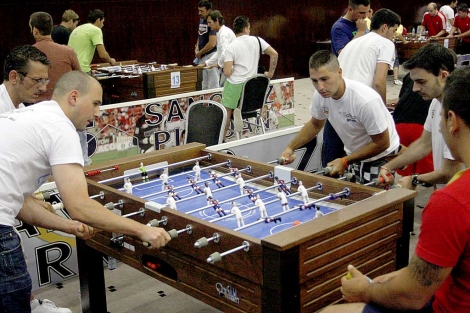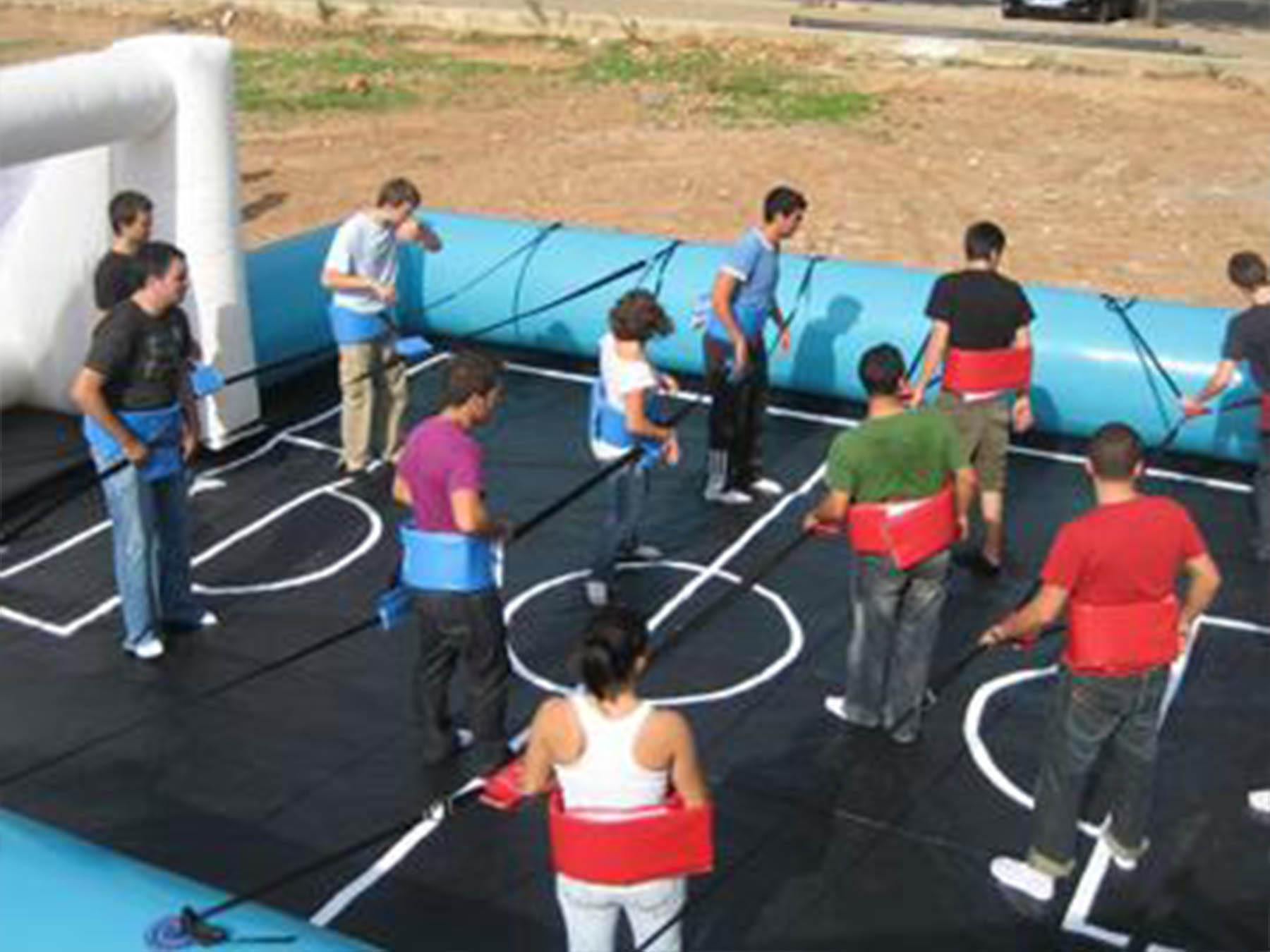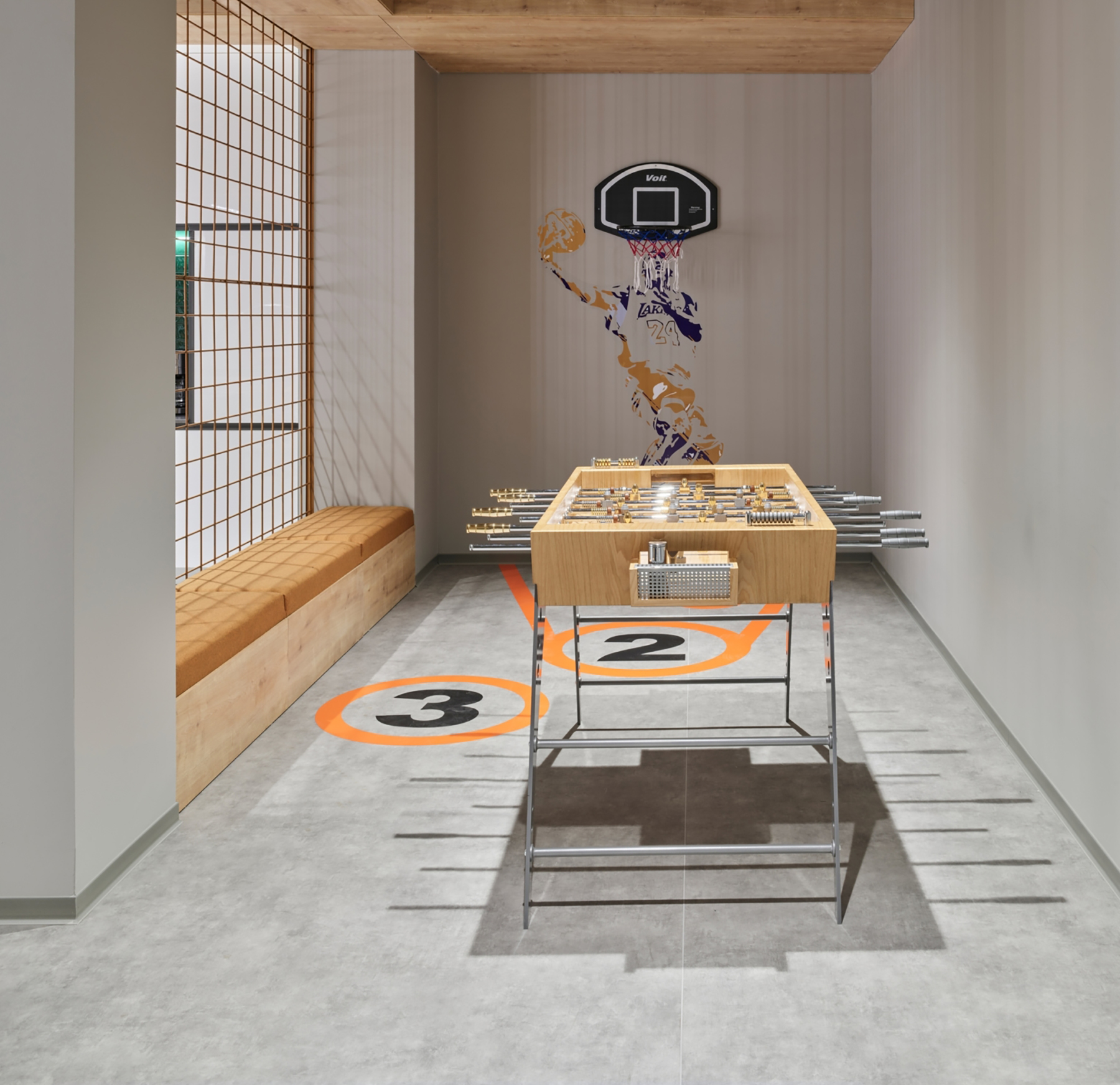Posted by Gaming Tables.
Welcome to the thrilling world of foosball – a game where skill, strategy, and sheer fun collide on a table. But foosball is more than just a whirl of tiny spinning players; it’s a vibrant tapestry woven with rich history, passionate communities, and surprising benefits extending into workplaces and beyond. Imagine a game that’s not only a centerpiece in bars and homes but also a catalyst for connection, a stress-buster in offices, and a collector’s delight. In “The Complete Guide to Foosball,” we dive deep into the heart of this beloved game, exploring its fascinating evolution from humble beginnings to a globally cherished pastime.
The World of Foosball
Foosball: A Game with Mysterious Origins
Foosball, a beloved game played around the globe, has a fascinating and somewhat mysterious history. Though many claim its invention, it’s widely believed to have originated in the early 20th century. The game really took off when Harold Searles Thornton patented it in the UK in 1923, aiming to bring the excitement of football indoors. Since then, foosball has evolved from its humble beginnings to become a staple in homes, bars, and recreational centers worldwide. Each foosball table, whether old or new, tells a part of this rich history, reflecting changes in design and technology over time. It’s not just a game; it’s a story of innovation and passion.
The Thrill That Binds Us Together
There’s something special about foosball that brings people together. Whether it’s the spinning of the players on the rods, the fast-paced movements of the ball, or the cheers of the spectators, foosball creates a vibrant atmosphere. It’s a game that’s as fun to watch as it is to play. In the heat of the match, players become immersed in a world of strategy, reflexes, and friendly competition. As a regular player once said, “Foosball is more than a game; it’s a drama unfolding on a mini-field.” This game goes beyond entertainment; it’s a way to make new friends, share laughs, and build memories. No matter where you are, when you hear the familiar clack of the ball on the table, you know fun is just around the corner.
Dominating the Foosball Table: Mastering the Game
Learning the Ropes: Foosball Basics
Every foosball champion starts with the basics. The game is played on a table featuring eight rods with miniature players attached, mirroring a soccer field. Players control these rods, aiming to score goals against their opponents. Mastering the basics like proper gripping, shooting, and passing is crucial. The game isn’t just about scoring; it’s about how you play. Foosball is not only about having quick reflexes but also about playing fair and respecting the rules. It’s a game that teaches the importance of sportsmanship, whether you win or lose. For newcomers, remember, every master was once a beginner. So, grab those handles with confidence and enjoy the journey!
Understanding Foosball Rules: A Quick Guide for Beginners
Foosball is not just about spinning rods and scoring goals; it’s a game of skill and strategy, governed by a set of rules that ensure fair play and enjoyment for all participants. Here’s a brief overview to get you started:
- The Objective: The primary goal is to score goals against your opponent by moving the ball into their goal using the figures mounted on rotating rods.
- Serving the Ball: The game begins with a serve, typically through a hole at the side of the table or by placing the ball at the center.
- No Spinning: Players must move the rods with skill and precision. Spinning the rods without control is generally not allowed.
- Ball in Play: Once the ball is served, it remains in play until a goal is scored or the ball is otherwise out of play.
- Scoring a Goal: A goal is scored when the ball completely crosses the goal line and enters the goal. This typically means the ball passes through the goalposts and falls into an opening or collection area behind the goal line. The first player or team to reach a predetermined number of goals is declared the winner.
- Fair Play: Respect and sportsmanship are key. Players should adhere to the rules and maintain a friendly competitive spirit.
These basic rules provide a foundation for playing foosball. Remember, the essence of foosball lies in its ability to bring people together for a fun and engaging experience.
Stepping Up Your Game: Advanced Techniques
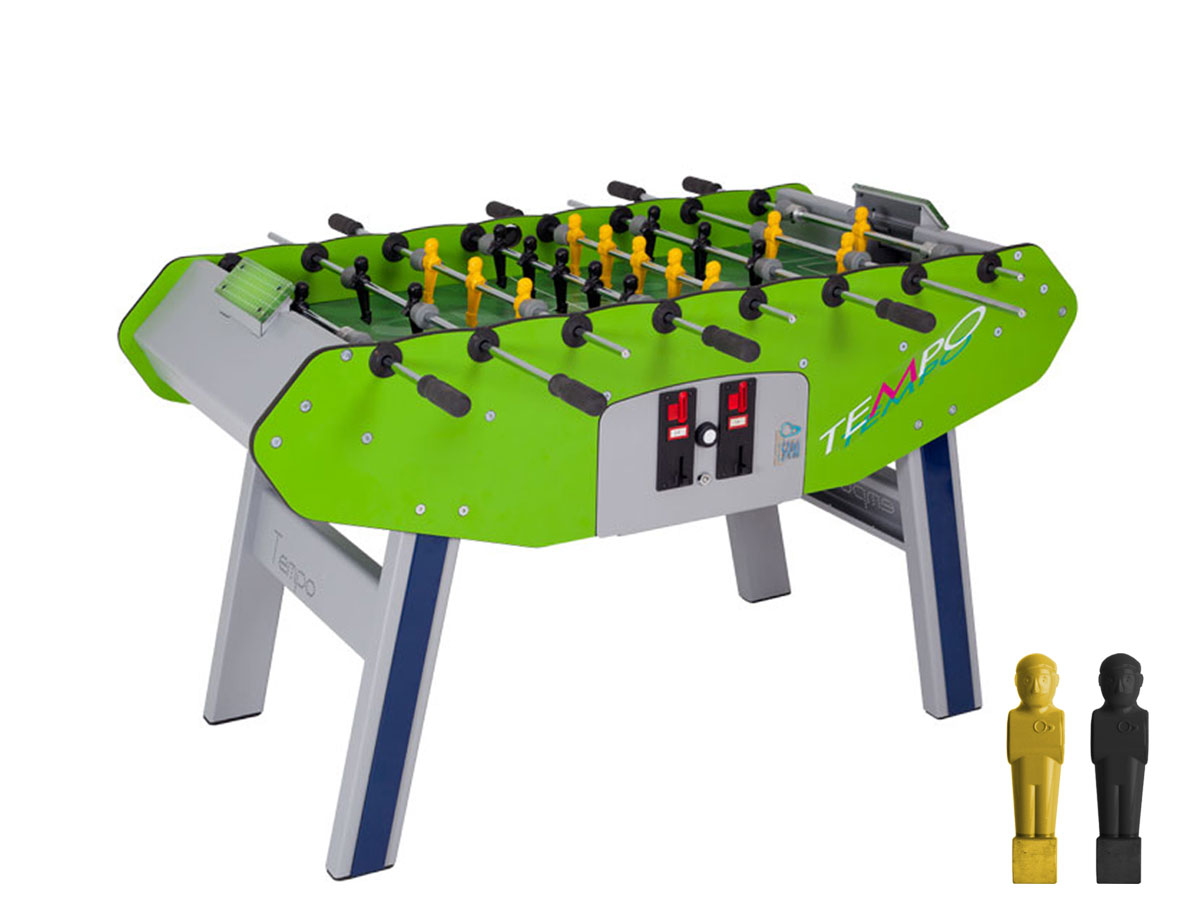
Mastering the Snake Shot:
A game-changer in advanced foosball is the snake shot, a technique where the player pinches the ball between the table and the foot of the figure, then rapidly flicks the rod back and forth to shoot. This move requires finesse and practice but can be incredibly effective in catching your opponent off-guard. To perfect the snake shot, focus on controlling the ball and the speed of your wrist flick. It’s a skill that can turn a good player into a formidable one.
Developing a Defensive Fortress:
Defense in foosball isn’t just about blocking shots; it’s about anticipation and positioning. A strong defensive strategy involves adjusting your figures to cover the most likely paths of the ball. Practice moving your defensive rods in sync to create a barrier. Remember, a good defense is proactive, not just reactive. By predicting your opponent’s moves, you can intercept passes and turn the tide of the game.
Strategies for the Foosball Connoisseur
Controlling the Game’s Pace:
One key strategy in foosball is controlling the pace of the game. This involves deliberately slowing down or speeding up your play to disrupt your opponent’s rhythm. For instance, if your opponent is aggressive, slowing the game down can throw them off balance. This strategic control requires not just skill, but also a deep understanding of the game’s flow.
The Art of Deception:
Deception is a crucial strategy in foosball. This can involve setting up shots or passes that look obvious, then quickly changing direction at the last moment. For example, you might line up for a direct shot but instead execute a quick pass to another figure, catching your opponent by surprise. Deception keeps your opponent guessing and opens up opportunities for scoring.
Decoding Foosball Tables: Aesthetics and Construction
Anatomy of a Foosball Table:
A foosball table is much more than a playing surface; it’s a complex assembly of parts, each with a specific purpose. The playing field should be smooth and level, allowing for consistent ball movement. Rods must be sturdy yet responsive, enabling swift player movements. Player figures, typically made of plastic or metal, are attached to these rods. Handles are designed for a firm, comfortable grip, aiding in precision control. Even the goals and scoring devices vary, some favoring a simple manual count while others opt for electronic tallying. The choice of materials, from solid wood to modern composites, not only affects the table’s durability but also its aesthetic appeal. A well-built table balances functional design with visual elegance, making it not just a game piece but a centerpiece in any room.

Choosing the Perfect Foosball Table:
When selecting a foosball table, consider your needs and environment. For casual play, a basic model might suffice. But for a more authentic experience, look for tables with counterbalanced players and solid wood construction. Size is important too; standard tables are around 56 inches long, but smaller options are available for limited spaces. If you’re keen on aesthetics, custom tables offer unique designs, from sleek modern looks to vintage styles. Also, consider the table’s playability and maintenance needs – some materials and designs require more care than others. Before purchasing, it’s advisable to play a few games on different tables to see what feels right for you.
Maintaining Your Foosball Table:
Proper maintenance ensures your foosball table stays in prime condition. Regular cleaning of the playing surface and wiping down the figures and rods can prevent dust buildup. Lubricating the rods is essential for smooth movement, but avoid over-lubricating to prevent greasiness. Check for loose screws and worn-out parts periodically and replace them as needed. If you own a wooden table, keep it away from direct sunlight and moisture to prevent warping. For those with collectible or vintage tables, more intensive care might be necessary, such as professional restoration services to maintain their value and functionality.
Foosball’s Social Impact: Building Connections
Foosball as a Social Catalyst:
The charm of foosball extends beyond the game itself; it lies in its power to connect people. In bars, offices, and community centers, foosball tables become social hubs, where people of all ages and backgrounds come together. The game’s appeal cuts across various social barriers, fostering friendships and camaraderie. A unique aspect of foosball is its inclusivity – it’s easy to learn, making it accessible to newcomers, yet challenging enough to keep seasoned players engaged. This blend of competition and fun creates a lively atmosphere where social interactions flourish. Stories from players often highlight how foosball helped them build networks, find common ground with strangers, and even forge lasting friendships. It’s a testament to the game’s role in strengthening community bonds and enhancing social well-being.

Foosball Tournaments and Leagues:
Foosball tournaments and leagues are vibrant social gatherings that enhance community connections. These events, held in various formats like single elimination or round robin, offer more than just competitive play. They are opportunities for social interaction, community building, and enjoyment among participants of different skill levels. Foosball leagues and tournaments create a platform for players to showcase their skills, engage with like-minded enthusiasts, and share their passion for the game. These events emphasize participation and fun, fostering a sense of belonging and camaraderie within the foosball community.
The Road to Foosball Glory: Inside Professional Competitions
The Thrilling World of Professional Foosball:
Professional foosball is a spectacle of skill and determination, where players from around the world showcase their mastery. Prestigious tournaments like the World Cup of Table Soccer and the Tornado World Championships are the pinnacle of this sport, drawing the best players to compete for glory. Here, legends of the game are made, like Frédéric Collignon and Tony Spredeman, whose names are synonymous with excellence in foosball. These events are more than competitions; they are celebrations of the foosball community, bringing together players, fans, and enthusiasts. The atmosphere is electrifying, filled with the intensity of matches and the cheers of the crowd, making them a must-visit for any foosball aficionado. As the sport grows, gaining more recognition and media coverage, the future of professional foosball looks promising, set to reach new heights and captivate even larger audiences.
Mastering the Art of Competitive Foosball:
Reaching the top ranks in competitive foosball requires a blend of talent, practice, and strategy. The snake shot, known for its speed and unpredictability, is a favorite among pros. But it’s not just about having a repertoire of shots; it’s about knowing when and how to use them. Players must also focus on developing a robust defense, learning to read their opponents’ strategies, and adapting mid-game. Mental toughness is as crucial as physical skill. The ability to stay calm under pressure, to think strategically, and to maintain focus throughout the game is what separates good players from champions. Top players often emphasize the importance of mental preparation and continuous learning and practice.
Foosball’s Health Benefits: A Fun Path to Fitness
Physical Benefits of Playing Foosball:
Foosball isn’t just a source of entertainment; it’s a surprisingly effective way to improve physical health. The game enhances hand-eye coordination and reflexes as players react swiftly to the ball’s movements. It’s a workout for the upper body, strengthening the arms, wrists, and shoulders through constant gripping and maneuvering of the rods. Playing foosball also improves flexibility and promotes endurance, especially during intense, prolonged matches. Regular engagement in the game can contribute to overall physical fitness, proving that staying active can be both fun and rewarding.
Mental Benefits of Foosball:
The benefits of foosball extend beyond the physical; it’s also a great mental exercise. Players develop sharper concentration and focus, vital skills both on and off the table. The game serves as an excellent stress reliever, providing a fun escape from daily routines and a chance to unwind. Strategic thinking is honed as players plan moves, anticipate opponents’ actions, and make quick decisions under pressure. Foosball also offers social and emotional benefits, such as improving confidence and fostering a sense of camaraderie among players. These mental and social advantages demonstrate that foosball is not just a game but a holistic activity that contributes positively to mental well-being.
Foosball in Pop Culture: Movies and TV Shows
Foosball’s Cinematic Journey:
Foosball has made memorable appearances in movies and television, often symbolizing friendship, competition, and nostalgia. A prime example is its role in the iconic TV show “Friends,” where the foosball table in Joey and Chandler’s apartment becomes a centerpiece of their living space, symbolizing their friendship and shared moments. In film and television, foosball tables often serve as a backdrop for pivotal scenes, contributing to character development and plot twists. These portrayals have helped cement foosball’s status in popular culture, resonating with audiences and bringing a wider appreciation for the game.

The game often appears in scenes depicting casual social interactions, highlighting its role as a communal activity. These references, though sometimes subtle, have a significant impact on popularizing foosball, inspiring new players and enthusiasts. The presence of foosball in various forms of media not only reflects its popularity but also reinforces its cultural significance, making it more than just a game, but a part of our collective social fabric.
The Allure of Collecting Foosball Tables: A Nostalgic Hobby
The Art of Collecting Vintage Foosball Tables:
Collecting vintage foosball tables is more than a hobby; it’s a journey into the heart of nostalgia and history. Each table, with its unique design and backstory, represents a different era and style. Collectors are drawn to the rarity and historical significance of these tables, seeking out pieces that stand out for their craftsmanship and story. Identifying authentic and valuable tables involves understanding the nuances of different manufacturers and production periods. Collectors’ circles are filled with fascinating tales of discovery and restoration, highlighting the emotional connection and dedication involved in this hobby. Restoration is a critical aspect, balancing between preserving the table’s historical value and ensuring it remains playable. These vintage tables are more than just play objects; they are cherished artifacts that capture the essence of foosball’s rich heritage.
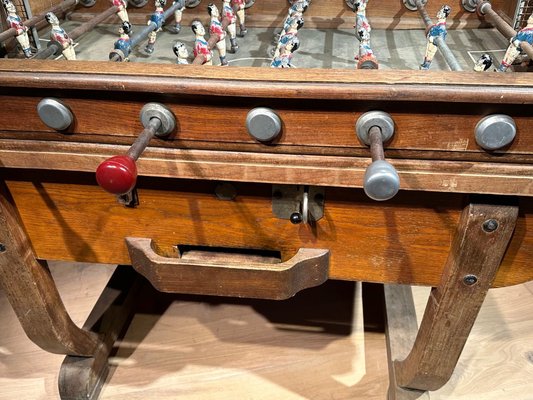
Showcasing and Preserving Foosball Table Collections:
A collector’s passion is often displayed in how they showcase their foosball tables. Creating a display is an art form, whether it’s organizing tables chronologically to tell the history of the game or thematically to showcase different styles. Proper maintenance is crucial to preserve these collectibles, requiring regular cleaning and controlled environments to protect against wear and tear. In today’s digital world, collectors also have the opportunity to share their passion online, using social media and forums to connect with fellow enthusiasts globally. This digital showcase not only allows for sharing and learning but also helps in building a community that appreciates the nostalgia and artistry of foosball tables. Through these collections, the legacy of foosball is kept alive, celebrated, and passed on to future generations.
Foosball in the Workplace: Boosting Employee Well-being and Productivity
Creating a Collaborative and Fun Work Environment:
In the modern workplace, employers are increasingly recognizing the value of creating an environment that promotes not only productivity but also employee well-being and job satisfaction. Integrating a foosball table into the office space can be a transformative move. It provides a fun and engaging break from the work routine, encouraging employees to interact in a relaxed and informal setting. This can lead to improved communication and collaboration among team members, breaking down barriers and fostering a more cohesive team dynamic.
Enhancing Employee Wellness and Stress Management:
Foosball tables in the office aren’t just for entertainment; they offer tangible benefits for employee health and stress management. Engaging in a quick game of foosball can be an effective way for employees to destress and recharge, especially during high-pressure periods. The physical activity involved, although moderate, contributes to better overall fitness and can be a welcome break from the sedentary nature of desk jobs. Moreover, the mental focus and concentration required for the game provide a mental diversion, helping employees return to their work tasks refreshed and with a clearer mind.
Cultivating a Positive Company Culture and Employee Engagement:
The presence of a foosball table can significantly enhance company culture, signaling an employer’s commitment to creating a balanced and employee-friendly workplace. It’s a gesture that can boost morale and increase job satisfaction, making the office a more enjoyable place to work. Additionally, foosball tournaments and casual play can serve as team-building activities, promoting healthy competition and camaraderie. Such initiatives can improve employee engagement, leading to higher retention rates and attracting prospective talent who value a workplace that supports both their professional growth and personal well-being.
Incorporating a foosball table into the office environment can have far-reaching positive effects on the workplace atmosphere and employee satisfaction. It’s a simple yet effective way to enhance team spirit, promote wellness, and create a more dynamic and enjoyable work environment.


